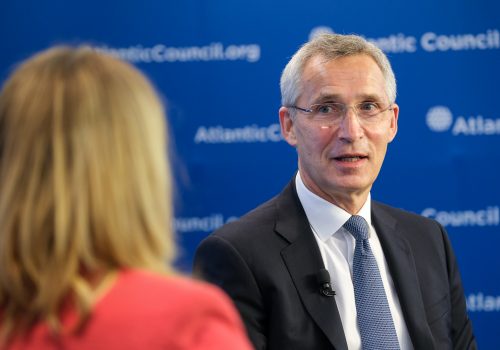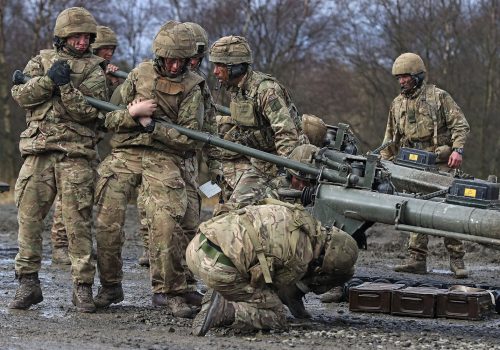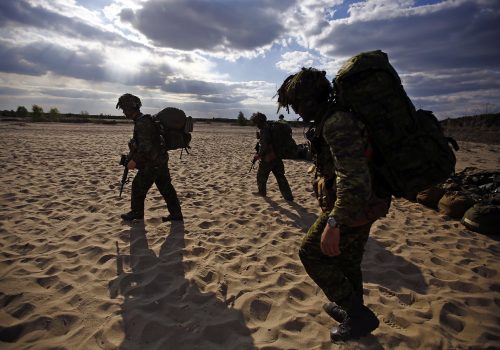The best defense: Why NATO should invest in resilience

The COVID-19 pandemic has magnified not only the successes and failures of the world’s health systems but also the importance of multilateral partnerships in biosecurity. Preparing for the next pandemic will require adaptation, interconnectivity, and resilience—the capacity to resist and recover quickly from major infrastructure shocks. Intergovernmental alliances like NATO can play a critical role in the relationship- and capacity-building necessary for a healthy global biosecurity sphere, which ensures a more secure world.
There are many lessons from the last fifteen months, but among them is a time-honored proverb: an ounce of prevention is worth a pound of cure. Many public-health and security crises are a product of critical infrastructure vulnerabilities, but an expanded focus on resilience in developing a global security strategy can prevent the next crisis. Responding to emergencies such as pandemics is far more expensive than preventing them and creates additional costs such as strained political cohesion and waning support for public institutions. Policies emphasizing resilience should fundamentally aim to minimize damage, restore stability quickly, and generate improved strategies for similar issues. To this end, there are several steps NATO can take to build a preventive, resilience-based approach to emerging global challenges.
Article 3 of the North Atlantic Treaty includes resilience as a critical element of its mission to achieve collective defense, and the Alliance supports multiple programs to build resilience against non-traditional threats. At its 2016 Warsaw Summit, NATO committed to “continue to enhance our resilience against the full spectrum of threats, including hybrid threats, from any direction,” and added that “resilience is an essential basis for credible deterrence and defence and effective fulfilment of the Alliance’s core tasks.” In June, NATO Secretary General Jens Stoltenberg said during an appearance at the Atlantic Council that a critical part of the Alliance’s agenda over the coming decade is to support “resilience technologies.”
Subscribe for events and publications on transatlantic security
Sign up for updates from the Atlantic Council’s Transatlantic Security Initiative, covering the debate on the greatest security challenges facing the North Atlantic Alliance and its key partners.
The COVID-19 pandemic has made clear NATO’s value in an unpredictable world. In 2020, NATO troops supported civilian efforts to combat the spread of COVID-19 by airlifting patients and medical equipment, building field hospitals, distributing supplies, repatriating civilians, establishing quarantine facilities and triage centers, assisting with decontamination, and sharing medical expertise. After this pandemic recedes, NATO’s proposals for responding to biothreats and other novel challenges should include investments in resilience to help combat “black swan” events, which may turn existing health or environmental emergencies into security crises. “Resilient societies are our first line of defense,” said NATO Deputy Secretary General Mircea Geoană in December, adding that “we have to put a much greater emphasis on resilience” across government, the private sector, and civil society.
NATO should start advancing resilience by leveraging and strengthening the following policies, programs, and partnerships:
- The NATO Science & Technology Organization (STO) develops innovative solutions with global experts to ensure that the Alliance’s technological capacity meets its needs in a quickly changing world. Allied governments contributed approximately 500 million euros to STO last year, forming a pool of already-allocated funding that could support resilience-building efforts. To advance and sustain technological innovation that enhances global resilience, the STO’s Science and Technology Board should push for a sustained allocation of funding specifically for resilience research, biomedical research and development, and ambitious pilot programs focused on sharing pathogen surveillance data between countries and their health systems, developing biomedical research infrastructure, and conducting training simulations for biothreat and public-health emergencies.
- The NATO Science for Peace and Security (SPS) Programme, as defined by the Alliance, promotes dialogue and cooperation “based on scientific research, technological innovation, and knowledge exchange. [It] offers funding, expert advice and support to… security-relevant activities that respond to NATO’s strategic objectives.” During the pandemic, SPS led efforts to advance the development of rapid COVID-19 tests. In the future, SPS should invest in ways to identify and combat swiftly rising global antimicrobial resistance, synthetic biology threats, and agricultural vulnerabilities; it should also invest in assessments and fortifications of medical and biosecurity stockpiles.
- The Euro-Atlantic Disaster Response Coordination Centre (EADRCC) has experience supporting responses to infectious-disease outbreaks, which threaten to increase as a consequence of climate change, industrialization, and global migration. EADRCC activities leverage emerging technologies to enhance resilience and build capacities for crisis response. Previous joint exercises with the SPS Program have included testing innovative telemedicine and communications platforms. EADRCC’s successful logistical coordination during the COVID-19 pandemic underscores its unique value; in the future, the EADRCC should expand its role in international cooperation and information-sharing between military medical services and civilian health systems.
- The Joint Chemical, Biological, Radiological, and Nuclear Defence (JCBRN) Centre of Excellence, a NATO military body focused on CBRN defense advice, education, training, and exercises, can convene member states and partners for training simulations and security activities related to novel threats in the context of regional and global issues. JCBRN should act on this capacity, in coordination with the Crisis Management and Disaster Response Centre of Excellence, to ensure that NATO member countries are prepared to combat future outbreaks and biological events. Strengthening bio-preparedness efforts through modeling and planning will help drive a resilient crisis response.
- Established during the pandemic, the NATO Pandemic Response Trust Fund stockpiles medical equipment and supplies for members of the Alliance and partners in need. Beyond the current pandemic, it can help defend against future chemical, biological, radiological, nuclear, and public-health threats—only if NATO maintains and adapts these stockpiled resources for other critical public-health and infrastructure needs.
Looking ahead, the NATO 2030 initiative aims to elevate democratic leadership around the world, advance biomedical science and global technology, and position NATO and its partners to tackle novel global security challenges through a lens of flexibility and adaptation. Strategic investments in these efforts will establish resilient frameworks for addressing emerging threats, which is critical for successful collective defense.
Realizing the full potential of these and other programs will require additional support from NATO operations, planning, policy, and civilian divisions. Allies and international organizations should also continue working with NATO on the ground to support equipment procurement and regional needs. In today’s unpredictable security environment, successfully responding to threats requires resilience—and NATO is well-positioned to make resilience a reality.
Jaclyn Levy is a Millennium Leadership Fellow at the Atlantic Council and the director of public policy at the Infectious Diseases Society of America.
Further reading

The Transatlantic Security Initiative, in the Scowcroft Center for Strategy and Security, shapes and influences the debate on the greatest security challenges facing the North Atlantic Alliance and its key partners.
Image: Boxes containing Korean-made medical protective equipment and COVID-19 diagnostic kits are loaded onto a Globemaster military transport plane of the North Atlantic Treaty Organization at Incheon International Airport, west of Seoul, South Korea on March 27, 2020. Photo by Yonhap News Agency via Latin America News Agency and REUTERS.


